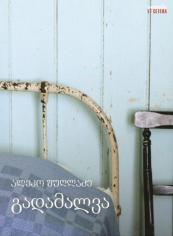The novel is autobiographical by nature. Every character is, in fact, a real person. The main protagonist, Aleko Shughladze’s mother, has an incurable illness. She becomes aware of this later, after she breaks a leg while praying and, when being examined in a clinic, a cancer specialist discovers that she is ill and informs Aleko. It turns out that a lot of people knew of her illness, but for some reason kept it hidden as long as they could from her son. Aleko also has a sister who has suffered from oligophrenic schizophrenia since she was a child. After their mother becomes bed-ridden, Aleko takes over the care of his sister and his life enters a difficult stage. This is a major ordeal in his life: he has to have patience and not lose his humanity. He should not grudge love to someone who is doomed to die. At the same time, the main protagonist recalls his life. Events from Soviet times intersect organically with today’s events. Together with all the difficulties of the Communist era, national traditions and rituals enter his mind, and he has to face up to this. What begins is a destruction of so-called sacral clichés, in the manner of the protagonist’s unconventional life, now with irony, now with sarcasm, concealed pain and a desire to escape from everything. Autobiographical space gradually loses track of the world shown in the novel. Another important character in the novel is an inspector who represents the side of Aleko’s relatives and is investigating a case which concerns the mysteriously obscured relationship of the main hero and his mother. The relatives, who are fans of ritual, try to blame Aleko for breaking with their ancestral traditions. In fact, the inspector has managed to study the protagonist’s life and, in the course of his investigation, the story of Aleko and his late father’s past surfaces. Aleko works as a book distributor, and his everyday relationships with various people is another aspect of the novel. One relationship is with a girl much younger than him, whom he is in love with. Very few people stand by him to the end, and one of these is a friend who is a mountain climber, who helps Aleko realise his extraordinary decision. With the friend’s help, Aleko hides his mother away in a remote village and announces that she has died. He goes through with a fake funeral in great and plausible detail, thus doing his duty by his relatives. After the ‘funeral’ he hides his mother even further away, in India. where he settles down with her at the foot of a holy mountain. The inspector and Aleko manage to meet only once, at the end of the novel. This happens when Aleko returns home in order to try and hide his sister, too.
'In this novel Aleko Shughladze uses acrobatic skill in his masterly transitions from one plot thread to another, one style to another, one mood to another: he is helped by a natural artistry… This is his writer’s ingenuity, to present you with what looks like a drama as a comedy, and a comedy as an absurdity, and an absurdity as a phantasmagoria, and a phantasmagoria as a drama once more. I am compelled to note that it is rare for anyone to hit on a text with such exhaustive cinematic dynamics. It requires only a little technical adjustment to make what one could call a ready-made film script, for an absurd film comedy, if you like,, or for a drama, or a cognitive film.'
Lela Kodalashvili, literary critic
'This book is one of contrasts. Aleko Shughladze keeps to the style he had when he entered literature, but finds new tonalities and probes more deeply. This is a novel about a struggle with death and illness, where people learn about making relationships in this struggle, where they are liberated from stereotypes and complexes. In the 1990s, when Aleko Shughladze first appeared, he attracted the reader with his distinctly free and easy way of writing, in which carefree humour, paradoxical points of view and existential difficulties were organically combined.'
Shota Iatashvili, poet, literary critic
Extract will be available soon
In case of using the information, please, indicate the source. 